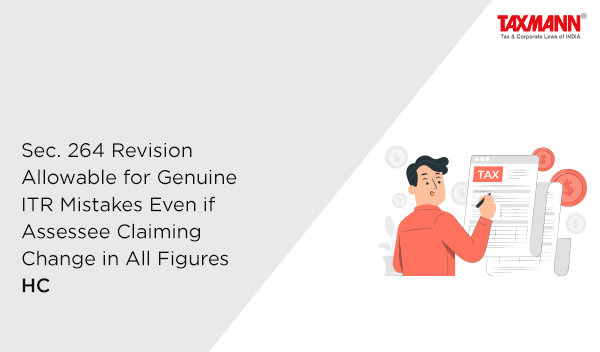Sec. 264 Revision Allowable for Genuine ITR Mistakes Even if Assessee Claiming Change in All Figures | HC
- Blog|News|Income Tax|
- 2 Min Read
- By Taxmann
- |
- Last Updated on 3 October, 2023

Case Details: Diwaker Tripathi v. PCIT - [2023] 154 taxmann.com 634 (Bombay)
Judiciary and Counsel Details
-
- K.R. Shriram & Dr N. K. Gokhale, JJ.
- Devendra H. Jain & Ms Radha Halbe for the Petitioner.
- Akhileshwar Sharma for the Respondent.
Facts of the Case
Assessee, an individual, mistakenly filled income details for Assessment year 2014-15 in return of income for the assessment year 2013-2014. Assessing Officer (AO) issued a demand based on this incorrect information. Subsequently, assessee filed his return of income for assessment year 2014-15 showing correct income.
Assessee applied for revision under section 264, which was rejected by the CIT. Aggrieved-assessee filed writ petition before the Bombay High Court.
High Court Held
The Bombay High Court held that CIT rejected assessee’s application because according to him, the assessee had sought a revision on some fact which was indisputably apparent from record.
He accepted that the assessee was claiming change in all the figures duly filled in by him in his verified ITR. This included changes to deductions, tax credits, gross total income, and its breakdown by income category. CIT held that the determination of income of any assessee is an exercise which involves deep scrutiny and cannot be merely substituted by acceptance of the income figure claimed by the assessee.
The Court held that the power conferred under Section 264 is very wide, and the Commissioner is duty-bound to apply his mind to the application filed by the assessee and pass such order thereon.
Section 264 also empowers him to call for record of any proceedings under the Act in which any order has been passed and make such inquiry or cause such inquiry to be made and pass such order as he thinks fit.
In the instant case, assessee made mistakes while filing ITR. It was not a deliberate mistake or an attempt to gain some unfair advantage or to evade any tax. Thus, assessee’s application was to be disposed of on merits.
Disclaimer: The content/information published on the website is only for general information of the user and shall not be construed as legal advice. While the Taxmann has exercised reasonable efforts to ensure the veracity of information/content published, Taxmann shall be under no liability in any manner whatsoever for incorrect information, if any.

Taxmann Publications has a dedicated in-house Research & Editorial Team. This team consists of a team of Chartered Accountants, Company Secretaries, and Lawyers. This team works under the guidance and supervision of editor-in-chief Mr Rakesh Bhargava.
The Research and Editorial Team is responsible for developing reliable and accurate content for the readers. The team follows the six-sigma approach to achieve the benchmark of zero error in its publications and research platforms. The team ensures that the following publication guidelines are thoroughly followed while developing the content:
- The statutory material is obtained only from the authorized and reliable sources
- All the latest developments in the judicial and legislative fields are covered
- Prepare the analytical write-ups on current, controversial, and important issues to help the readers to understand the concept and its implications
- Every content published by Taxmann is complete, accurate and lucid
- All evidence-based statements are supported with proper reference to Section, Circular No., Notification No. or citations
- The golden rules of grammar, style and consistency are thoroughly followed
- Font and size that’s easy to read and remain consistent across all imprint and digital publications are applied



 CA | CS | CMA
CA | CS | CMA
